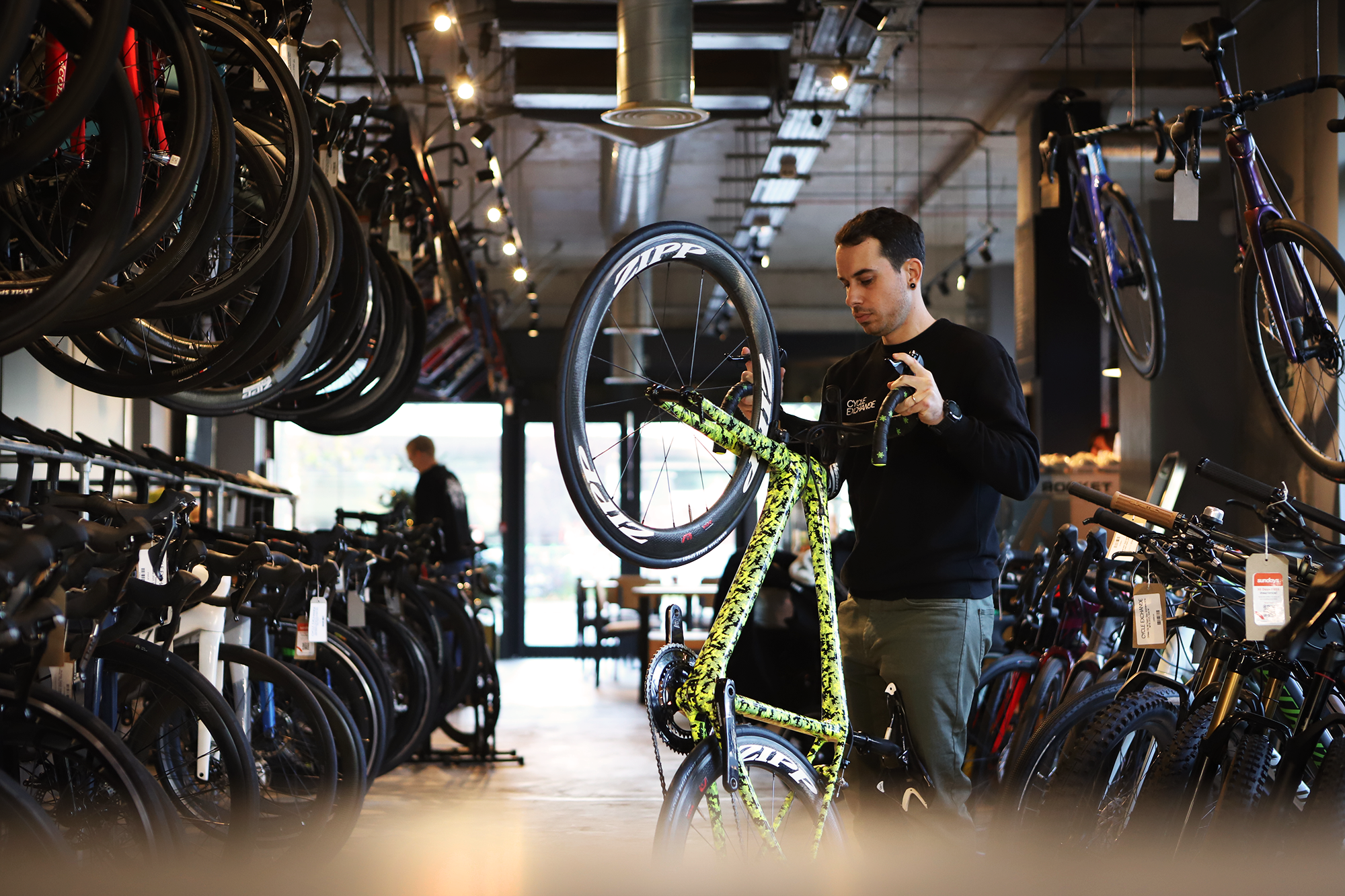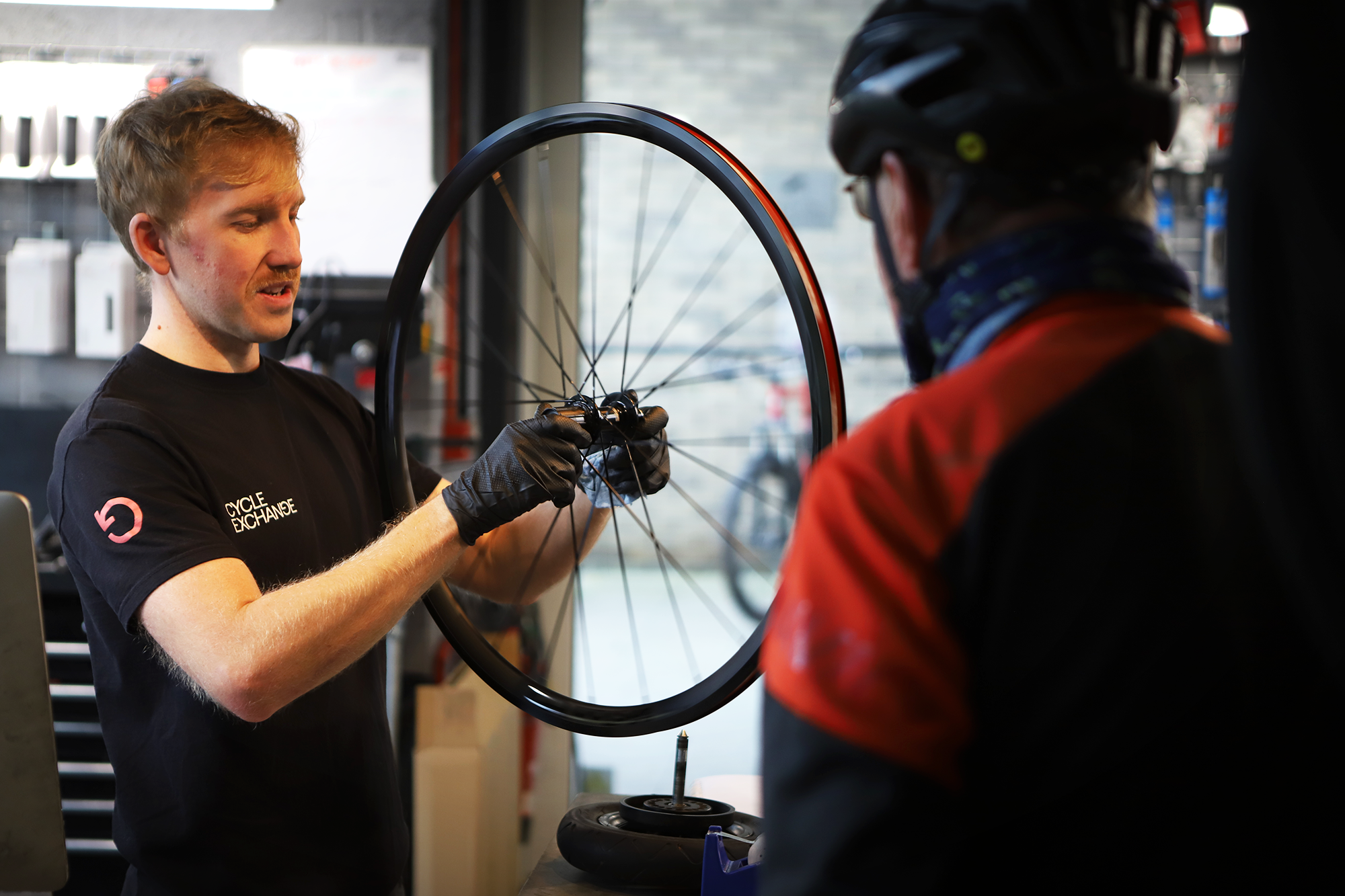Cycle Exchange is celebrating its 10th anniversary this year. Daniel Blackham caught up with founder Matt Connelley to talk about a decade in business.
This piece first appeared in the July edition of BikeBiz magazine – get your free subscription here
Cycle Exchange started out in July 2013 as a part-time side business for Matt Connelley.
Founded to enable cyclists to buy and sell second hand bikes with confidence and security, it is now one of the UK’s go-to destinations for buying, selling or exchanging premium used bikes, especially in the road market.
“We started off with just e-commerce, so I was operating out of a storage unit,” said Connelley.
After linking up with Matt Allingham, then owner of The Bicycle Service, Connelley took the leap into physical retail in Kingston upon Thames, just outside London.
“That really worked because of the location and the fact that we were trying to focus on higher end road second hand,” said Connelley.
“Second hand wasn’t so much of a thing then so it was just to give customers that assurance.
“The shop was actually really important as a starting point for us.”
As the business continued to expand, Connelley decided to search for new premises and found the long-term home of Cycle Exchange in July 2019.
“We were looking to move for quite a while but we wanted to stay in the area,” said Connelley.
“It also had to be cost effective because margins on bikes can be a challenge in the best of times and with second hand, it requires even more discipline.
“Covid was a bit scary because we’d just made quite a large investment in this place so it was a bit of a concern when I was sitting in here on my own with the shutters closed.”

As everyone in the industry is familiar with, the end of April 2020 brought people flooding to bike shops as people sought to make the most of outdoor activities.
“We haven’t really looked back since then,” said Connelley.
“We’ve done about 40% growth a year since 2018, so not rocket ship growth but a solid steady growth without giving any equity away as well.
“There was a little bit of a dip at the end of last year when everyone started dumping stock, but it only lasted for a month or so.”
Focusing on high end road, and particularly secondhand, along with the reuse and recycle aspects of the businesses has kept Cycle Exchange at the forefront of people’s minds.
A key part of the businesses relationship with its customers is its newsletter which goes out to around 40,000 people.
“There’s people just buying bikes one off, but there’s a lot of people who continue to come back to us,” said Connelley.
“There’s quite a few that buy multiple times a year and swap out. We do a buy back guarantee so that works really well for some people who don’t like the hassle of buying and selling themselves.”
Although Cycle Exchange has faced similar challenges to many independent businesses in the bike industry, it has weathered the storm and is on track to achieve growth in the region of 20% again this year
“High-end road has generally stayed quite resilient,” said Connelley.
“I don’t think it was as oversupplied as some of the other sectors, and it’s also traditionally a more affluent customer. We’re also still heavily skewed towards Greater London which generally has more disposable income for that type of purchase.
“So we’ve been somewhat lucky that the niche that we’re in has been less impacted than others.”

Partnership power
CE Commercial is a partnership program with manufacturers, distributors, retailers, professional and semi professional race teams, and tour and hire companies.
This sees the company offer stock purchasing, helpful terms, and shipping and distribution assistance.
It has stepped up recently with a new warehouse space in Esher.
“We’ve got quite a significant warehouse operation now which has given us the capability to grow more,” said Connelley.
“We’re doing more with manufacturers. Not only with just trading with their customers but also stock they want to offload it could be ex-demo, could be returns and warranty.
“We sometimes sell it for them and sometimes buy it [outright].”
Operating on such a scale in the used bike market comes with its own risks, but Cycle Exchange has the infrastructure to manage the challenges.
“The downside is we’re using our own cash a lot of the time, but the upside is we’re not forced to buy anything we don’t want to,” said Connelley.
“The pricing model two years ago was purely operated on the retail price and then a condition and desirability factor.
“Our pricing model now gets fed by various different sources on the internet, including Ebay, so we can get a very close handle on exactly where pricing is across the market.”
CE Commercial has seen the company go beyond borders and develop relationships in mainland Europe, something that has cooled in recent times.
“Brexit killed that because of the import duties,” said Connelley. “Plus the stock situation across the market meant that a lot of the outfits we used to trade within Europe don’t really need to sell beyond their own borders.
“We used to do a lot of business with professional teams but that’s been more of a challenge because of that 14% tax that hits bikes when it comes in.
“As you can imagine, that makes quite a big difference.”
Among those professional teams are Ineos Grenadiers and Team DSM. This not only presented customers the opportunity to own a piece of the peloton, but also some great marketing content.
“We’re not out of that game,” said Connelley.
“We’ve always got an eye on what we can do in Europe.”

A game changer
Another string to the Cycle Exchange bow was added when the company started to offer free home collection.
“It’s a complete game changer,” said Connelley.
“We were totally reliant on retail purchasing directly from customers so the only way we could carry on the growth story coming out of lockdown when stocks start to dry up was to really ramp up buying from individuals.
“The only way to do that is to show up at someone’s door.”
The service means customers don’t have the hassle of organising a courier. This removes the worry of packaging the bike so it doesn’t arrive damaged – a common problem for many e-commerce companies.
“Generally it’s a mechanic driving the van so if there are any issues we just agree on the part price and then the cash is in their account pretty soon” said Connelley.
“It was just frictionless and enabled us to keep growing our stock pool all through covid and afterwards.
“It costs more to buy it that way but we figured it was better to make some margin over nothing.”

Destination retail
With consumer purchasing habits shifting to predominantly online first, many businesses are looking to reduce investment in physical retail.
Cycle Exchange is bucking that trend with a modern location that features a workshop alongside collaborations with 139 Coffee and RideWrap.
Earlier this year the store also hosted its first event to preview Parcours’ collaboration with Classified.
“The way e-commerce has evolved, retail stores are really part of your marketing budget,” said Connelley.
“For us 90% of our sales are done online, and that might be online after speaking to us or it might be online after coming in a couple of weeks before.
“You have to have the right people in a location so that, even if customers don’t actually come here, they know it’s here, they can see it on social media, click on the website or call someone.
“So in my mind retail spaces are becoming more and more marketing because you’re using it to help close sales.”
 BikeBiz Bicycle and cycling retail news
BikeBiz Bicycle and cycling retail news



